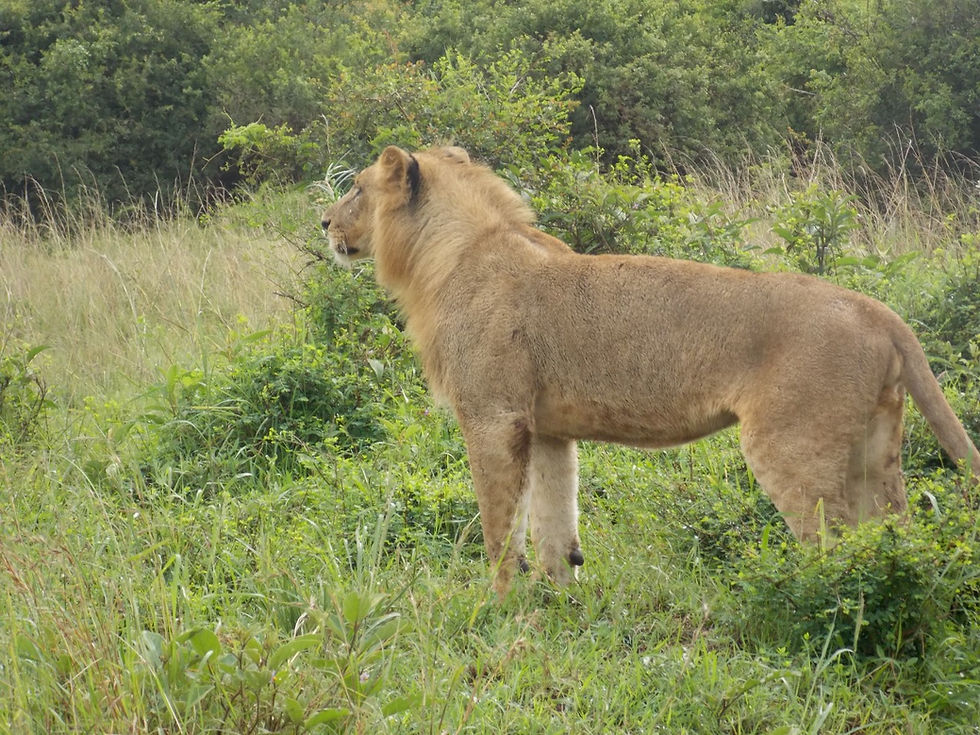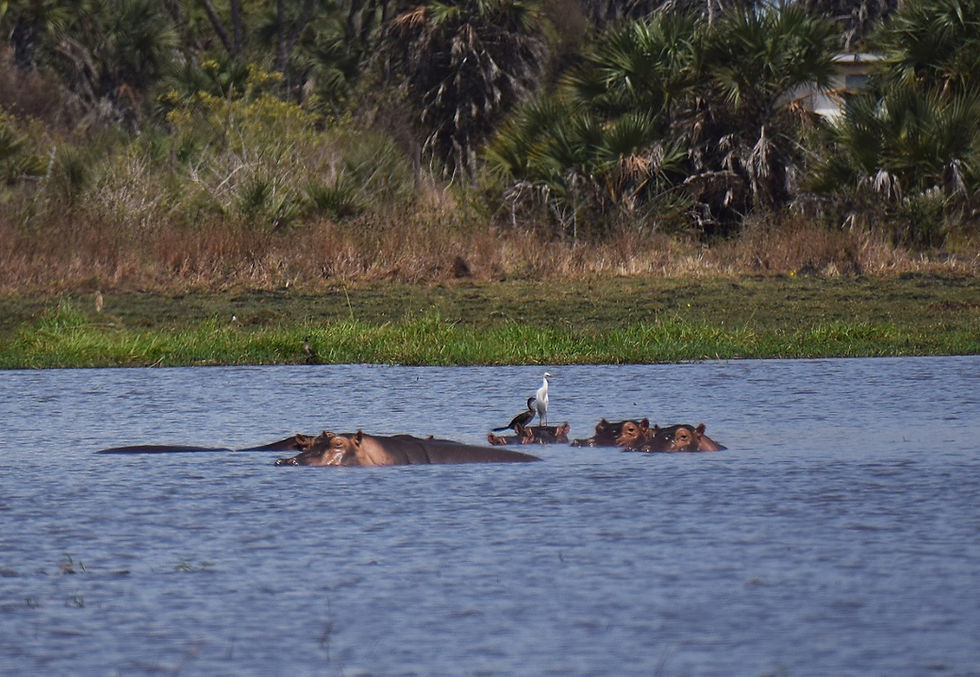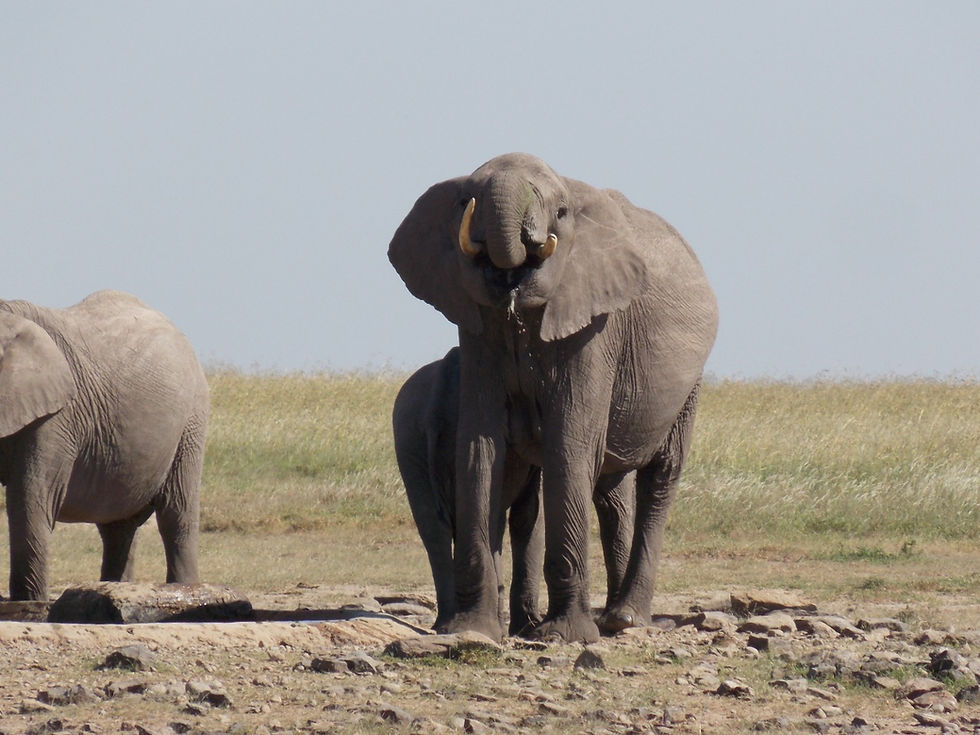2018 Report.
- Wild Heart Kenya
- Nov 21, 2021
- 5 min read
Updated: Nov 25, 2021
This year - thanks your incredible support we've made tremendous strides in doing what we love and do best, helping wildlife and the communities that live with them co-exist. Solutions that work for both wildlife and communities is at the very heart of what we do. Our year started on a low note with predation of livestock by lions on the boundary of Nairobi National Park, what usually happens is that the lions follow the herds of zebra, gazelle and impala out of the parks leading to Maasai dwellings.
This brings them in contact with cows and goats that are precious to the maasai and easy food for the lions. This can sadly at times lead to retaliatory killings where lions are speared. We at Wildheart immediately sent in support for Lion lights installed in the very next hours. And because of your support the lions of Nairobi National Park have a chance, to be wild and safe. After last year’s gruelling drought in main land Lamu it seemed that the dry season this year was lingering on as well, we resolved on having a long lasting solution and had a borehole drilled in the areas that were most prone to drying and conflict. Again because of your generosity we were able to drill a borehole that supports both wildlife and the community nearby. The area is now transformed from a dry area to a green haven teeming with hippos blowing water bubbles, birds flying about and not forgetting the women of the nearby community who don’t have to trek for miles to get water.
In Tsavo West, South of Kenya, home to tens of thousands of wild elephants, the farmers living close by are constantly in fear of having their farms raided by elephants and destruction of their very vital produce that they depend on for their livelihood, this year we supported Nicholas - a farmer who’s farm which was constantly being raided by elephants – we installed bee hives that will stop elephants from entering farms, provide honey which the farmers will sell and earn an extra income and also prevent retaliatory attacks to wildlife and create a tolerant attitude toward wildlife. All this is possible because you supported us! Lastly we’d like to acknowledge our volunteers who give in their precious time, skills in organizing and logistics - because of them our administration costs are kept at an almost zero ensuring every penny donated goes directly in support of wildlife and the communities that live with them. With heaps of hippo hope and gratitude, we wish you a very Merry Christmas and happy holidays and look forward to your support in the coming year, together we can ensure that wildlife and communities live in harmony. Lions, livestock and lights. Acacia silhouettes on the savannah, a burning sunrise and roaring lions. Roars you hear across the plains as the lion king himself claims his territory, roaring to other cats, calling out loud and proud, roars that make you feel so insignificant yet they leave you in awe. This is how you wake up in the wild, sadly this could soon change. Bravery, nobility, wilderness, royalty, resilience, rugged, raw beauty are words synonymous with lions. Endangered, human-wildlife conflict, decline in numbers and loss of habitat have also unfortunately become synonymous with these magnificent beasts.

Their numbers have significantly decreased by 30-50% in the last two decades. Human-wildlife conflict and loss of habitat have contributed greatly to this decline. With Kenya's estimated lion population is at 2000, every lion lost is one too much.
Nairobi National park is home to 40 lions, some of the most famous in the world.
During the wet season, the herbivores move south out of the National park into community lands - pasture is in abundance, and the community depend on this for food for their livestock – which is a vital source of income for them. The lions follow the herds and this is where the conflict begins. The lions come across livestock - easy prey and end up eating them usually at night. As this continues, the community gets frustrated and this leads to retaliatory attacks, most of them brutal. The lions are either speared or poisoned.
'Lion Entry Deterrent Lights' have been used in several places that are hot-spots for human-wildlife conflict. This isn't something new, in areas like South America, the same ideas have been used to keep predators at bay. The basic idea is flashing-lights, powered by a solar battery create an illusion of a watchmen walking around the boma and therefore stops predation. Reports indicate a reduction of 95% of cases of predation, nearly all of the 5% cases were due to systems not being maintained or not looked after.
At the beginning of this year, we got reports of predation of livestock in the southern part of the Nairobi National Park, in Empakasi village, a lion had gone into community land and preyed on sheep and goats. To prevent retaliatory attacks, we immediately dispatched funds and had the lights installed – this will prevent lions from coming into the livestock enclosure and also retaliatory attacks. All this made possible because of your generous support!

Women, Water and Wildlife.
Last year’s devastating drought finally ended but the beginning of this year, the dry spell was lingering on, dams were quickly drying up especially at Chomo dam and to avoid a crisis like last year, we quickly resolved on having a borehole drilled that would serve both wildlife and communities.
A borehole here meant that hippo and buffalos wouldn’t stray into nearby villages in search of water and cause havoc. It also meant lesser walking distances for women and girls when going in search of water. Our work started a few days later and in 10 days we had precious fresh flowing water. The area was teeming with hippo, buffalo, topi, warthogs and all sorts of colorful birds – a true haven indeed – all possible because you supported us.

Not only has this place been transformed, a community that once feared hippos is now grateful with them and have taken responsibility of their wellbeing! Most importantly having a constant flow of water means incidences of conflicts are at zero! Not only for today and tomorrow, but for years and years to come!

The community came and expressed their gratitude. We also take this moment to acknowledge and appreciate the bravery and hard work put in by the rangers in ensuring our safety, for the long hours they put in, just so wildlife and the communities that live with them flourish.
Heaps of hippo hugs for your support!
Hives for Human-Wildlife Co-existence.
Conflict – one of the massive and yet less talked about threats facing elephants today. As they migrate from one place to another in search of pasture and water, they come across farms they damage precious crops that farmers depend on for their livelihood and put their lives at risk. One herd of elephants passing through farms can cause damage to crops and mean that a farmer can lose his earnings for a whole year.

This year we worked with a farmer – Nicholas – his farm was constantly being raided by elephants and his crops which he highly depends on for income were at risk. With your help we’ve erected a bee hive fence around his farm. Elephants are terrified of bees as they can enter their trunks and cause immense pain. Therefore, having a bee hive fence is effective and keeps the elephants at bay. Not only are the elephants kept at a distance, honey will be harvested in a few month which will bring in income for the farmer and also help with the bee population.

We’re elated that not only is this working for our big, gigantic friends but also for our tiny critters! A farm that’s protected from crop raiding means less incidences of human wildlife conflicts and a community that lives well with wildlife means well being for our elephants!






Comments